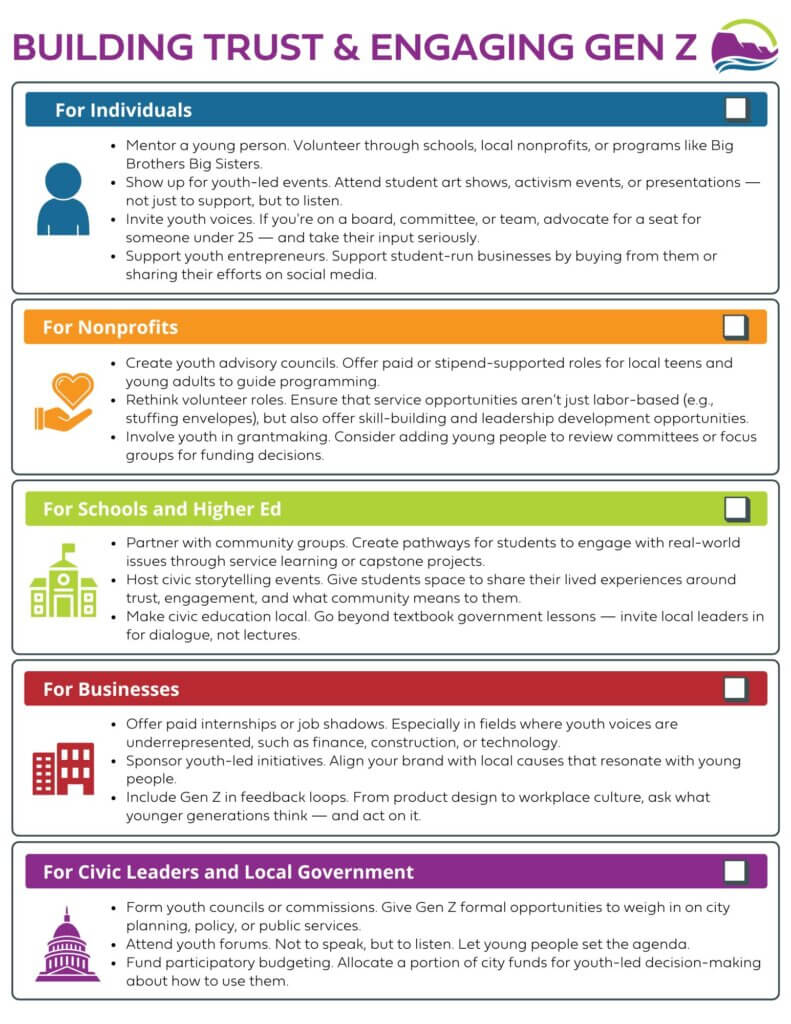When trust breaks down: Gen Z and La Crosse’s future
July 30, 2025
 | By Chad Dull, Chief Executive Officer |
Why rebuilding trust starts with listening, not lecturing
 Some stories don’t begin with hope; they begin with the hollow feeling of absence. A missing hand at the table. A voice that’s quiet when we need it loud. That’s where we find ourselves today with Generation Z. Not because they aren’t present, but because many are wondering if their presence really matters.
Some stories don’t begin with hope; they begin with the hollow feeling of absence. A missing hand at the table. A voice that’s quiet when we need it loud. That’s where we find ourselves today with Generation Z. Not because they aren’t present, but because many are wondering if their presence really matters.
Let’s be honest. Trust in institutions is wearing thin — and not just in headlines, but in hallways, homes, and coffee shops right here in La Crosse. A 2024 Associated Press-NORC Center for Public Affairs poll found that just 10% of Americans under 30 had a “great deal” of confidence in the U.S. Supreme Court. That’s not a typo. Ten percent. A 2023 Gallup poll tells us that nearly half of young adults have “hardly any confidence” in banks. And if we think that’s just a national issue, let’s remember: our local banks, courts, governments, and nonprofits — they’re the ones these young adults interact with. And they’re not immune to the erosion of trust.
The real danger isn’t just cynicism. It’s withdrawal. According to the University of Maryland’s Do Good Institute, volunteerism among Gen Z has plummeted since the pandemic. Only 23% of adults under 30 reported volunteering in 2023 — down from 30% a decade ago. That’s a steep drop, and it’s not because they don’t care. It’s because many are wondering: Does it make a difference?
At La Crosse Area Community Foundation, we’re asking that question, too — but with a twist. What would it take to rebuild trust — starting here, starting now?
Trust is something you give
In his book “The Speed of Trust,” author Stephen M.R. Covey writes,
“The best way to make someone trustworthy is to trust them.”
That idea is especially powerful when we think about Gen Z. Too often, young people are asked to prove themselves before they’re granted a voice or a seat at the table. But what if we flipped that script? What if trust wasn’t something they had to earn — but something we offered first?
Every generation has been misunderstood on its way to leadership. Baby boomers were once written off as rebellious. Gen X was labeled apathetic. Millennials were accused of being entitled. And yet, each generation has found its way forward — contributing, shaping, and strengthening their communities when given the chance.
Gen Z is no different. What they need from us isn’t a test of worthiness. They need belief. Support. And the freedom to lead in ways that reflect the world they’re inheriting — not the one we remember.
What we can do in La Crosse
Here’s what we know: trust isn’t built through messaging. It’s built through shared power. The best national models don’t “do for” young people — they do with them. That means making space for Gen Z to co-create solutions, not just receive them.
Organizations like DoSomething.org are piloting paid youth advisory councils, putting teenagers and young adults in real decision-making roles. Others are distributing micro-grants for youth-led initiatives — projects designed, pitched, and run by teens themselves. And philanthropic leaders are funding platforms that treat youth as co-creators, not passive recipients.
These aren’t feel-good gestures. They’re investments in leadership. In ownership. In voice. They’re acts of trust.
What would that look like in the Greater La Crosse Area?
Imagine a high school student from West Salem leading a grant-funded podcast to explore what civic engagement means to their peers. A UW-La Crosse sophomore designing a mental health resource fair, backed by mentorship and funding from local donors. Or Gen Z community members sitting on grant committees — not as token representatives, but as voting members.
These ideas aren’t far off. Some are already taking shape. But if we want to do more than react to Gen Z’s distrust, we need to act from a place of trust ourselves.
The risk of doing nothing
If we fail to act, we risk something greater than disconnection. We risk losing a generation of changemakers. The very institutions we hope they’ll one day lead — school boards, city councils, nonprofits — will become places they avoid rather than shape. And that’s not a future any of us should settle for.
Here in La Crosse, we have a choice. We can lament the disconnection, or we can start building bridges. One voice, one grant, one shared decision at a time.
Because the truth is, young people aren’t the problem; they’re the opportunity. If we meet them with humility, authenticity, and an open seat at the table, we might just find that trust wasn’t gone — it was waiting for an invitation.

